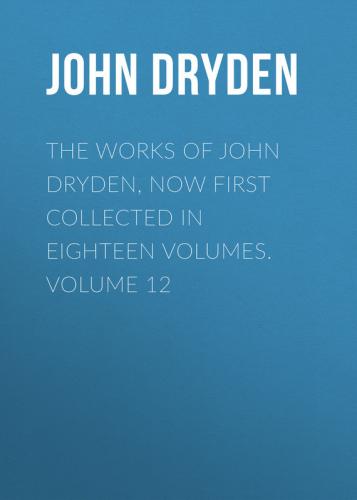Into min herte, that wol my bane be.
The fayrenesse of a lady that I se
Yond in the gardin, roming to and fro,
Is cause of all my crying and wo:
I n'ot whe'r she be woman or goddesse,
But Venus is it, sothly, as I gesse.
And therwithall on knees adoun he fill,
And sayde, Venus, if it be your will
You in this gardin thus to transfigure,
Beforn me sorweful wretched creature,
Out of this prison helpe that we may scape,
And if so be our destine be shape
By eterne word, to dien in prison,
Of our lignage have som compassion,
That is so low ybrought by tyrannie.
And with that word Arcita gan espie
Wher as this lady romed to and fro,
And with that sight hire beaute hurt him so,
That if that Palamon was wounded sore,
Arcite is hurt as moche as he, or more:
And with a sigh he sayde pitously,
The fresshe bentee sleth me sodenly,
Of hire that rometh in yonder place.
And but I have hire mercie and hire grace,
That I may seen hire at the leste way,
I n'am but ded, there n'is no more to say.
This Palamon, whan he these wordes herd,
Dispitously he loked, and answerd,
Whether sayest thou this in ernest or in play?
Nay, quod Arcite, in ernest be my fay;
God helpe me so, me lust full yvel play.
This Palamon gan knit his browes twey:
It were, quod he, to thee no gret honour
For to be false, ne for to be traytour
To me, that am thy cosin and thy brother:
Ysworne ful depe, and eche of us to other,
That neuer for to dien in the peine,
Till that the deth departen shal us tweine,
Neyther of us in love to hindre other,
Ne in non other cas, my leve brother;
But that thou shuldest trewely forther me
In evry cas, as I shuld forther thee.
This was thin oth, and min also certain,
I wot it wel thou darst it not withsain:
Thus art thou of my conseil out of doute,
And now thou woldest falsly ben aboute
To love my lady, whom I love and serve,
And ever shal, til that min herte sterve.
Now certes, false Arcite, thou shalt not so;
I loved hire firste, and tolde thee my wo,
As to my conseil, and to my brother sworne
To forther me, as I have tolde beforne,
For which thou art ybounden as a knight
To helpen me, if it lie in thy might;
Or elles art thou false, I dare wel sain.
This Arcita full proudly spake again:
Thou shalt, quod he, be rather false than I,
And thou art false, I tell thee utterly.
For par amour I loved hire first, or thou.
What wolt thou sayn, thou wistest nat right now
Whether she were a woman or a goddesse:
Thin is affection of holinesse,
And min is love as to a creature,
For which I tolde thee min aventure,
As to my cosin, and my brother sworne.
I pose, that thou lovedst hire beforne:
Wost thou not wel the olde clerkes sawe,
That who shall give a lover any lawe?
Love is a greter lawe, by my pan,
Than may be yeven of any erthly man;
And therfore positif lawe, and swiche decree
Is broken all day for love in eche degree.
A man moste nedes love, maugre his hed;
He may nat fleen it though he shuld be ded,
All be she maid, or widewe, or elles wif.
And eke it is not likely all thy lif
To stonden in hire grace, no more shal I;
For well thou wost thyselven veraily,
That thou and I be damned to prison
Perpetuel, us gaineth no raunson.
We strive, as did the houndes for the bone,
They fought all day, and yet hir part was none:
Ther came a kyte, while that they were so wrothe,
And bare away the bone betwix hem bothe:
And, therfore, at kinges court, my brother,
Eche man for himself, ther is non other.
Love if thee lust, for I love, and ay shal;
And sothly, leve brother, this is al.
Here in this prison mosten we endure,
And everich of us take his aventure.
Great was the strif, and long, betwix hem twey,
If that I hadde leiser for to sey;
But to the effect. It happed on a day,
(To tell it you as shortly as I may,)
A worthy duk that highte Perithous,
That felaw was to this duk Theseus
Sin thilke day that they were children lite,
Was come to Athenes, his felaw to visite,
And for to play, as he was wont to do,
For in this world he loved no man so;
And he loved him as tenderly again:
So well they loved, as old bokes sain,
That whan that on was ded, sothly to tell,
His felaw wente and sought him doun in hell;
But of that storie list me not to write.
Duk Perithous loved wel Arcite,
And had him knowe at Thebes yere by yere,
And finally, at request and praiere
Of Perithous, withouten any raunson,
Duk Theseus let him out of prison,
Frely to gon wher that him list over all,
In swiche a gise as I you tellen shall.
This was the forword, plainly for to endite,
Betwixen Theseus and him Arcite:
That if so were, that Arcite were yfound
Ever in his lif, by day or night, o stound
In any countree of this Theseus,
And he were caught, it was accorded thus,
That with a swerd he shulde lese his hed;
Ther was non other remedie, ne rede.
But taketh his leve, and homeward he him speede:
Let him beware, his nekke lieth to wedde.
How
